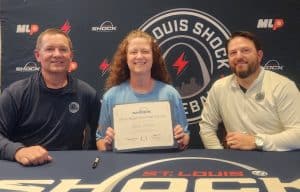Home rule fails in Columbia
Columbia voters decided the fate of a home rule referendum on Tuesday, with the question failing by a nearly three-to-one margin as of press time.
The vote tally was 1,989 against to 634 for, or 76 to 24 percent.
Columbia aldermen approved a resolution at the beginning of the year to pose the question to residents whether the city should become a home rule municipality.
Under home rule, the city would have been granted authorities apart from ones expressly stated in the Illinois Compiled Statutes, including the ability to impose home-rule taxes.
City officials contended home rule was needed to provide additional revenue to fund needed projects without raising residential property taxes.
Columbia Mayor Bob Hill spoke with the Republic-Times after the results were in.
“First of all, it was good to see such a large turnout. A lot of people were engaged in the process,” Hill said. “The people have spoken loud,” Hill said.
With budget talks beginning next week, Hill added aldermen will have some “tough decisions” regarding city services moving forward.
“We’ll get through it and move forward,” Hill concluded.
Columbia City Administrator Doug Brimm echoed Hill’s sentiment.
“The level of interest in the city recently is remarkable,” Brimm said. “I hope the public stays engaged as the City Council and staff move forward to address the needs of our community with the resources available.”
In Columbia, five seats in the city’s four aldermanic wards were on the ballot – although there were only two contested races.
In Ward I, incumbent Jay Riddle faced challenger Paula Hutchinson, wife of former Columbia Mayor Kevin Hutchinson.
Riddle won, gaining 459 votes compared to Hutchinson’s 159 as of press time.
Some vote-by-mail ballots have yet to be turned in.
Riddle said, in a second term, he would hope to improve transparency between voters and the city, complete projects for his ward and keep property taxes low.
In Ward II, incumbent Kevin Martens lost his seat to challenger Lauren Nobbe. She gained 424 votes to Martens’ 194 votes of ballots received as of late Tuesday night.
During her campaign, Nobbe spoke of her election goal of assisting and communicating on behalf of local small businesses and the community as a whole while having a “my door is always open” philosophy.
Ward II Alderman Michael Lawlor ran unopposed to retain the unexpired two-year term of former alderman Mark Roessler, whom Lawlor was appointed to replace upon Roessler’s resignation in October.
Aldermen Jeff Huch and Steve Holtkamp also ran unopposed in Wards III and IV, respectively.
Home rule was not the only referendum on the ballot this year.
Residents of the Maeystown Fire Protection District voted on two referenda posed as “a way to keep up with the cost it takes to maintain the fire district,” according to Maeystown Fire Chief Lynden Prange.
Both questions passed by a nearly three-to-one margin.
The first question authorizes the Maeystown Fire Protection District to levy a special property tax of no more than .10 percent.
The second item, “proposition to increase limiting rate,” allows for the limiting rate to increase by 0.085 percent, which would set the limiting rate at 0.45 percent of a property’s value.
The questions passed with 66 and 67 percent approval, respectively.
In Hecker, a question was posed asking residents if the village should be granted the authority to establish an electrical aggregate system.
The referendum passed with nearly 65 percent of the vote.
This program allows voluntary participation of residents and small businesses in an electric utility service managed by the village.
Also on the April 4 ballot, voters in Monroe County south of Columbia elected a new trustee in subdistrict 1 of the Southwestern Illinois College Community College District 522.
Douglas Sachtleben and Tracy Vallett, both of Red Bud, were candidates in subdistrict 1.
As of press time, it appeared as if Vallett would win the seat. She held a slight margin in Monroe County, but had about 53 percent of votes in Randolph County, 1,277 votes, to Sachtleben’s 28 percent, or 665 votes, with 86 percent of precincts reporting.
Steve Campo ran unopposed in subdistrict 3, which in Monroe County covers Columbia and areas north.
SWIC trustee terms are for four years.






